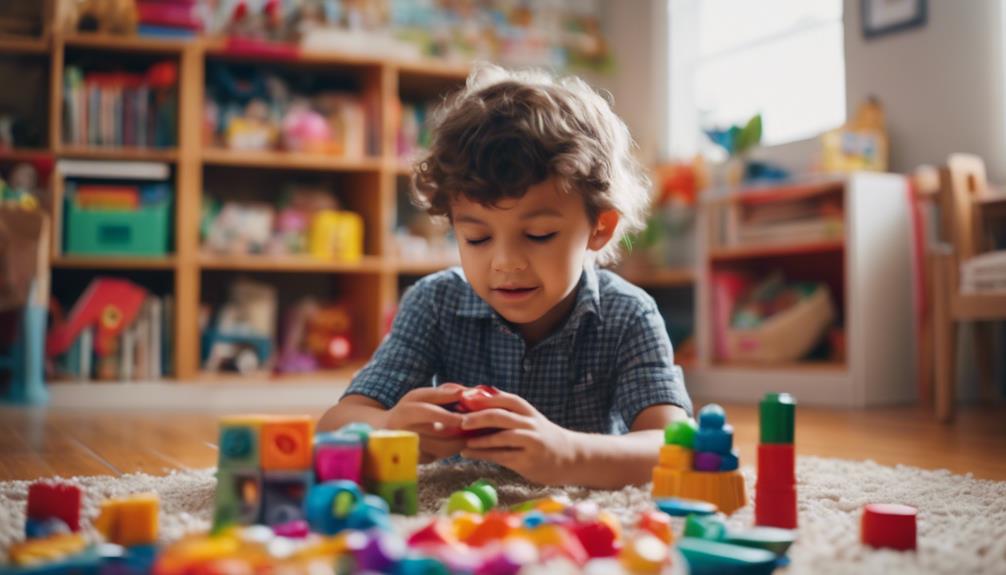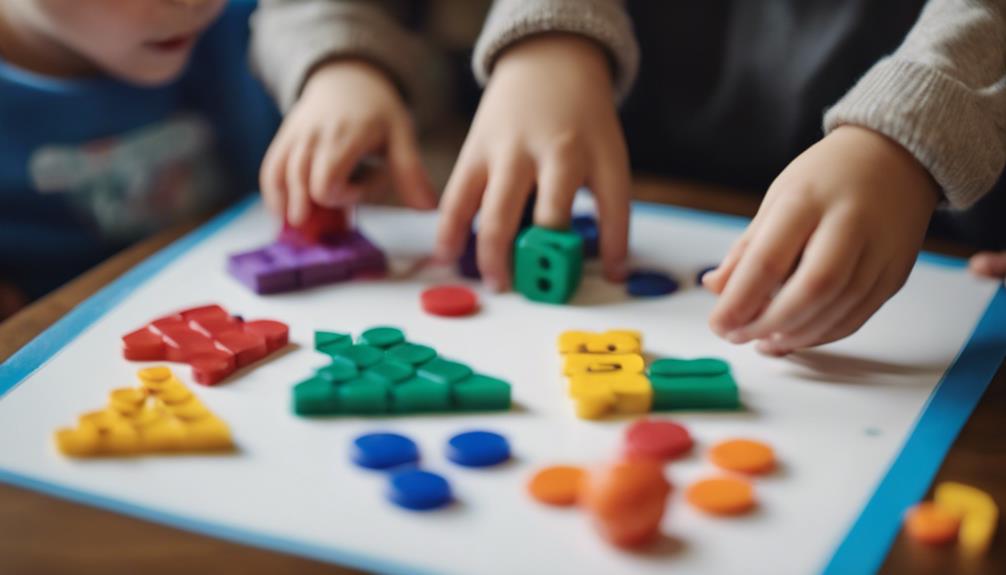To enhance your children’s learning abilities, focus on early childhood development by creating an engaging environment and being aware of developmental milestones. Utilize play-based learning to improve cognitive and social skills through problem-solving and imagination. Encourage exploration through hands-on activities, open-ended toys, and outdoor experiences. Promote literacy by reading daily, exploring different genres, and engaging in writing tasks. Improve math skills through enjoyable activities and real-life examples. Cultivate a passion for learning by nurturing curiosity and creativity. Work with teachers to create personalized educational experiences and offer support at home. By following these strategies, you can establish a strong educational foundation for your child’s academic success and development.
Key Takeaways
- Engage in play-based learning activities to boost cognitive and social skills.
- Encourage exploration through hands-on experiences and outdoor play.
- Foster literacy skills by reading daily and engaging in writing activities.
- Develop math skills through fun activities and real-life applications.
- Collaborate with teachers, provide tailored support, and stay proactive in communication.
Early Childhood Development
Early childhood development forms the essential groundwork for children's lifelong learning potential and achievements. As a parent, you play an important role in nurturing your child's early development, which greatly impacts their ability to learn and succeed.
Research shows that the experiences children have in their formative years greatly influence brain development and cognitive abilities. By providing a stimulating and safe learning environment at home, you can enhance your child's social, emotional, and cognitive skills, setting a strong foundation for future learning endeavors.
Understanding the developmental milestones of early childhood is key in supporting your child's growth and learning. By recognizing and tailoring educational activities to meet these milestones, you can effectively help your child reach their full learning potential.
Play-Based Learning Importance

Why is play-based learning essential for children's development and academic success?
Play-based learning is vital for your child's growth as it not only fosters cognitive abilities but also enhances social and emotional skills. Through play, children engage in activities that promote problem-solving, creativity, and imagination, laying a strong foundation for their future academic endeavors. Research indicates that play-based learning greatly boosts language and literacy skills in children, preparing them for effective communication and comprehension in various subjects.
Additionally, play allows kids to learn important life skills such as collaboration, communication, and emotional regulation, which are essential for maneuvering social interactions and academic challenges. By incorporating play into your child's learning experience, you're setting them up for overall academic success and improved long-term learning outcomes.
Embracing play-based learning as a fundamental part of your child's educational journey can have a profound impact on their development and future achievements.
Encouraging Exploration and Discovery

To foster curiosity in children, it's essential to embrace hands-on activities that encourage exploration and discovery. By providing open-ended toys and materials, you can stimulate creativity and problem-solving skills in young minds.
Offering opportunities for outdoor exploration further enhances sensory experiences and nurtures a natural sense of curiosity.
Foster Curiosity Through Play
Encouraging exploration and discovery through play is vital for fostering curiosity in children. By providing open-ended play experiences, you can stimulate their problem-solving skills and boost their creativity.
Offering sensory activities and hands-on experiments allows children to engage their senses and learn through exploration. Introducing a variety of toys, games, and materials can spark their interest and curiosity, encouraging them to investigate and discover new things.
Supporting imaginative play is another way to enhance children's problem-solving abilities. Through pretend play, kids can navigate different scenarios, think critically, and come up with solutions, all while having fun. This type of play not only fosters a love for learning but also nurtures essential skills that will benefit them in various areas of their lives.
Creating a safe and stimulating environment where children can freely explore, experiment, and learn through play is essential. By offering opportunities for hands-on activities and encouraging curiosity, you can help children develop a lifelong passion for discovery and learning.
Embrace Hands-On Activities
Embrace hands-on activities as a means to ignite curiosity and foster exploration and discovery in children. By incorporating active learning experiences, you can help your child develop the skills they need to succeed in various areas of their life.
Here are some ways hands-on activities can benefit your child:
- Building blocks and puzzles promote problem-solving and critical thinking skills.
- Sensory play, such as sand and water activities, enhances cognitive development.
- Discovery-based learning experiences like nature walks and science experiments cultivate curiosity and creativity.
- Hands-on art projects like painting and crafting stimulate fine motor skills and self-expression.
- Providing opportunities for hands-on learning helps children develop a love for exploration and discovery.
Engaging your child in these activities not only makes learning fun but also equips them with essential skills that will set a strong foundation for their future endeavors.
Building Literacy Skills

Reading together daily with your child for just 20 minutes can expose them to a vast array of vocabulary, aiding in their language development.
Encouraging writing activities, such as journaling or drawing, not only enhances fine motor skills but also lays a strong foundation for literacy.
Exploring diverse genres of books opens up new worlds of imagination, enriching vocabulary and comprehension skills in children.
Reading Together Daily
Enhancing your child's literacy skills starts with daily shared reading sessions. Reading together daily with your child is essential in helping them succeed in learning to read.
Here are some key benefits of reading together regularly:
- Vocabulary Expansion: Daily reading exposes your child to new words, enhancing their language skills and vocabulary.
- Bonding Time: Shared reading sessions create a special bond between you and your child, fostering a love for books and learning.
- Knowledge Growth: Exposure to various genres and topics through reading helps broaden your child's knowledge and imagination.
- Critical Thinking: Discussing stories and characters during reading sessions encourages critical thinking skills.
- Language Development: Reading aloud provides a model for proper language use, supporting overall communication skills.
Encouraging Writing Activities
Engage your child in daily writing activities to boost their literacy skills and foster creativity. Help your child develop their academic abilities by encouraging them to write regularly.
Journaling, letter writing, and creating stories are effective ways to enhance your child's writing skills. Encourage them to express their experiences, thoughts, and feelings through writing, promoting self-expression.
Providing writing prompts or topics can ignite creativity and imagination in your child's writing endeavors. Offering constructive feedback and praise will motivate and improve their writing skills over time.
Integrate writing into daily routines, such as making grocery lists, writing thank you notes, or creating a family newsletter, to make learning both fun and practical. By engaging in these writing activities, your child can develop essential literacy skills that will benefit them academically and creatively.
Exploring Diverse Genres
Encouraging children to explore a variety of book genres can greatly enhance their literacy skills and cultivate a passion for reading. By exposing your child to a diverse range of genres, you can help build their critical thinking skills and expand their vocabulary.
Here are five ways exploring diverse genres can aid in your child's progress:
- Broadening Perspectives: Reading different genres like fiction, non-fiction, fantasy, and biographies can broaden your child's perspectives and enhance their understanding of the world.
- Developing Critical Thinking: Exposure to diverse genres helps children develop critical thinking skills by analyzing different writing styles and themes.
- Discovering Preferences: Introducing your child to various genres allows them to discover their preferences and interests in literature, guiding them towards books they enjoy.
- Cultural Awareness: Reading diverse genres promotes cultural awareness and empathy by exposing children to different backgrounds and experiences through stories.
- Lifelong Learning: Access to a wide range of genres promotes lifelong learning, creativity, and intellectual growth in children, laying a strong foundation for their future educational pursuits.
Reading and Writing Skills

Reading to your children daily can greatly enhance their vocabulary and language skills. By engaging in storytelling and reading various books, you're actively helping your child develop essential reading and writing skills.
Encouraging your child to participate in writing activities like journaling aids in expressing their thoughts and ideas effectively. Introducing phonics instruction is vital for laying a strong foundation in reading and spelling. It enables your child to grasp the fundamental sounds and patterns of language, enhancing their overall literacy skills.
Additionally, practicing writing, such as forming letters and words, not only improves their handwriting but also enhances fine motor skills and hand-eye coordination. Exposure to a diverse range of genres and writing styles fosters creativity and critical thinking in children, expanding their understanding of different forms of expression.
Developing Math Skills

Developing math skills in kids is essential for their academic success and cognitive development. Understanding basic math concepts, engaging in fun math activities, and applying math to real-life situations are key components of fostering a strong mathematical foundation.
Basic Math Concepts
Understanding basic math concepts is essential for children's overall development and academic success. Here are some key ways to help your child grasp these concepts:
- Recognition of shapes, colors, and patterns can lay the foundation for mathematical thinking in young children, aiding in positive learning experiences.
- Introducing numbers and counting at an early age is vital for the development of basic math skills, setting a strong mathematical base.
- Board games and puzzles not only provide entertainment but also assist in problem-solving and collaboration, which can enhance your child's math skills.
- Hands-on experiences with math manipulatives offer tangible learning opportunities, allowing children to understand abstract mathematical concepts in a concrete manner.
- Investing in educational materials that support basic math concepts, such as workbooks or interactive apps, can greatly benefit your child's math skills development, providing additional avenues for learning and practice.
Fun Math Activities
Engage your child in fun math activities to develop their math skills in an interactive and enjoyable way. Start by incorporating everyday objects like toys, fruits, or steps for counting exercises, which can help build number recognition skills effortlessly.
Utilize entertaining math games such as 'I Spy Shapes' and 'Number Bingo' to enhance their understanding of shapes, colors, and patterns while making learning engaging.
Hands-on activities with math manipulatives like blocks, beads, or shapes can promote interactive learning and make mathematical concepts more tangible.
Explore puzzles and board games that involve counting, sorting, and problem-solving to stimulate their mathematical thinking in a playful manner.
Additionally, introduce basic math concepts through real-life activities like measuring ingredients while baking or identifying shapes in the environment.
Encouraging your child to participate in these diverse fun math activities won't only boost their math skills but also make learning an enjoyable experience.
Real-Life Math Applications
Integrating math skills into daily activities like cooking and shopping equips children with practical knowledge for real-life situations. Understanding math applications in real-world contexts is essential for children to grasp the relevance of mathematical concepts in their everyday lives.
Here are five ways to help children develop their math skills through real-life applications:
- Engaging children in cooking activities teaches them about measurement, fractions, and conversions.
- Shopping trips provide opportunities for practicing addition, subtraction, and money skills.
- Planning a budget for a project or event encourages critical thinking and problem-solving.
- Understanding math in real-world contexts enhances children's mathematical reasoning and decision-making skills.
- By applying math skills in practical situations, children can develop a deeper understanding of mathematical concepts and their significance in various scenarios.
Fostering Love of Learning

To cultivate a love of learning in children, encourage their curiosity and exploration from an early age. Providing opportunities for hands-on experiences and sensory play can greatly engage children in the learning process. Reading to your child regularly is essential to instill a love for books and develop early literacy skills. Supporting your child's creativity by allowing them to explore different interests and activities can also foster a positive attitude towards learning. Celebrating milestones and achievements is crucial in boosting your child's confidence and motivation in their learning journey.
| Ways to Foster Love of Learning |
|---|
| Encourage curiosity and exploration |
| Provide hands-on experiences |
| Read to your child regularly |
| Support creativity and interests |
| Celebrate milestones and achievements |
Choosing Quality Programs

Encouraging your child's love for learning can be further enhanced by carefully selecting quality programs that cater to their educational needs and interests. When choosing programs for your child, consider the following:
- Look for programs with qualified instructors who have experience in early childhood education.
- Evaluate programs based on your child's individual needs and learning style.
- Consider programs that offer a balance of structured activities and free play for holistic development.
- Check if the program provides opportunities for hands-on learning experiences and exploration.
- Confirm that the program follows a curriculum that aligns with your goals for your child's learning and development.
Supporting Learning at Home

Establishing consistent study habits at home is essential for supporting your child's learning and academic development. By setting aside specific times each day for learning activities, you create a structured routine that reinforces the importance of education.
Designating a study area free from distractions helps your child focus and concentrate on their tasks. Encouraging a positive attitude towards learning is vital. Incorporate fun and interactive educational activities to make learning enjoyable.
Providing educational resources and materials for independent exploration further enhances their learning experience. It's important to monitor your child's screen time, ensuring a healthy balance between educational activities and entertainment.
Partnership With Teachers

Developing a strong partnership with your child's teachers is key to supporting their academic growth and fostering a collaborative learning environment. To guarantee your child's success, it's essential to support and engage with the educators who play an important role in their educational journey.
Here are some ways you can effectively partner with your child's teachers:
- Attend parent-teacher conferences and meetings to stay informed about your child's progress.
- Utilize communication tools provided by the school to regularly connect with teachers.
- Collaborate with teachers to create tailored educational experiences for your child.
- Volunteer at school events, participate in classroom activities, and offer assistance when needed.
- Stay proactive in reaching out to teachers to discuss your child's strengths and areas for improvement.
Frequently Asked Questions
How Will You Develop the Skill in Children?
You develop the skill in children by encouraging hands-on activities, establishing routines, providing positive reinforcement, offering diverse educational materials, modeling a positive attitude, and praising their efforts. Consistency and motivation are key to fostering learning skills in kids.
What Are Five Guidelines for Parents to Help Children Learn?
You can guide your child's learning by offering consistent praise, establishing a routine, communicating openly, providing varied learning opportunities, and promoting a positive attitude towards mistakes. These steps help develop their learning skills and confidence.
How Can Parents Best Guide Their Children's Learning?
To guide your child's learning best, engage in educational activities, establish consistent routines, create a study area with minimal distractions, foster a positive attitude towards education, and build a strong partnership with teachers.
How Can Parents Develop Parenting Skills?
You can develop parenting skills by actively engaging in your child's education, understanding their stages of development, building partnerships with teachers, encouraging independence and a love for learning, and utilizing resources for guidance.
Conclusion
In fostering your child's learning skills, remember that consistency is essential. By encouraging exploration and discovery, building literacy skills, and fostering a love of learning, you can set your child up for success in their educational journey.
Partnering with teachers and choosing quality programs will also play a vital role in their development. Stay committed to supporting learning at home and watch your child thrive academically.
Remember, practice makes perfect!










